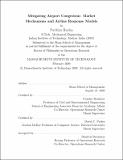Mitigating airport congestion : market mechanisms and airline response models
Author(s)
Harsha, Pavithra
DownloadFull printable version (1.109Mb)
Other Contributors
Massachusetts Institute of Technology. Operations Research Center.
Advisor
Cynthia Barnhart and David C. Parkes.
Terms of use
Metadata
Show full item recordAbstract
Efficient allocation of scarce resources in networks is an important problem worldwide. In this thesis, we focus on resource allocation problems in a network of congested airports. The increasing demand for access to the world's major commercial airports combined with the limited operational capacity at many of these airports have led to growing air traffic congestion resulting in several billion dollars of delay cost every year. In this thesis, we study two demand-management techniques -- strategic and operational approaches -- to mitigate airport congestion. As a strategic initiative, auctions have been proposed to allocate runway slot capacity. We focus on two elements in the design of such slot auctions -- airline valuations and activity rules. An aspect of airport slot market environments, which we argue must be considered in auction design, is the fact that the participating airlines are budget-constrained. -- The problem of finding the best bundle of slots on which to bid in an iterative combinatorial auction, also called the preference elicitation problem, is a particularly hard problem, even more in the case of airlines in a slot auction. We propose a valuation model, called the Aggregated Integrated Airline Scheduling and Fleet Assignment Model, to help airlines understand the true value of the different bundles of slots in the auction. This model is efficient and was found to be robust to data uncertainty in our experimental simulations. (cont.) -- Activity rules are checks made by the auctioneer at the end of every round to suppress strategic behavior by bidders and to promote consistent, continual preference elicitation. These rules find applications in several real world scenarios including slot auctions. We show that the commonly used activity rules are not applicable for slot auctions as they prevent straightforward behavior by budget-constrained bidders. We propose the notion of a strong activity rule which characterizes straightforward bidding strategies. We then show how a strong activity rule in the context of budget-constrained bidders (and quasilinear bidders) can be expressed as a linear feasibility problem. This work on activity rules also applies to more general iterative combinatorial auctions.We also study operational (real-time) demand-management initiatives that are used when there are sudden drops in capacity at airports due to various uncertainties, such as bad-weather. We propose a system design that integrates the capacity allocation, airline recovery and inter-airline slot exchange procedures, and suggest metrics to evaluate the different approaches to fair allocations.
Description
Thesis (Ph. D.)--Massachusetts Institute of Technology, Sloan School of Management, Operations Research Center, 2009. This electronic version was submitted by the student author. The certified thesis is available in the Institute Archives and Special Collections. Includes bibliographical references (leaves 157-165).
Date issued
2009Department
Massachusetts Institute of Technology. Operations Research Center; Sloan School of ManagementPublisher
Massachusetts Institute of Technology
Keywords
Operations Research Center.